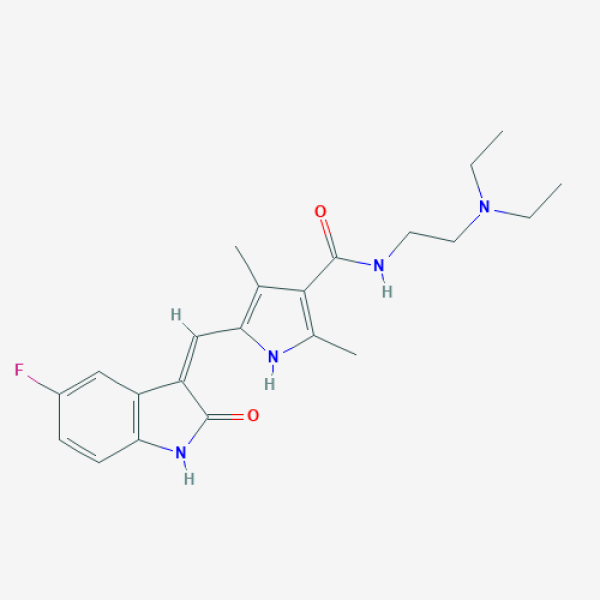Sunitinib
A tyrosine kinase inhibitor.
General information
Sunitinib is an indole derivate receptor protein-tyrosine kinase inhibitor. It manifests antineoplastic and neuroprotective activities. Sunitinib also acts as a vascular endothelial growth factor receptor antagonist and an immunomodulator (ChEBI).
Sunitinib on DrugBank
Sunitinib on PubChem
Sunitinib on Wikipedia
Marketed as
SUTENT

CCN(CC)CCNC(=O)C1=C(NC(=C1C)/C=C\2/C3=C(C=CC(=C3)F)NC2=O)C
Supporting references
| Link | Tested on | Impact factor | Notes | Publication date |
|---|---|---|---|---|
|
Sunitinib reduces the infection of SARS-CoV, MERS-CoV and SARS-CoV-2 partially by inhibiting AP2M1 phosphorylation
Small molecule In vitro |
ACE2-HeLa cells | 6.26 | Inhibition of AP2M1 phosphorylation in vitro, which likely leads to inhibition clathrin-dependent SARS-CoV-2 cell entry, at concentrations that are achieved via standard therapeutic dosing. |
Oct/13/2020 |
|
Heparan sulfate assists SARS-CoV-2 in cell entry and can be targeted by approved drugs in vitro
Polysaccharide Small molecule In vitro |
ACE2-GFP HEK293T cells; Calu-3 cells; Vero E6 cells; SARS-CoV-2 pseudotyped particles | 6.26 | Inhibits SARS-CoV-2 pseudovirus cell entry with IC50 of 10 μM in ACE2-GFP HEK293T cells. At 10 μM concentration the drug reduced virus-induced cytopathic effect in Vero E6 cells by ca. 30%. It might act through actin cytoskeleton metabolism disregulation. |
Nov/04/2020 |
|
Machine learning identifies molecular regulators and therapeutics for targeting SARS-CoV2-induced cytokine release
Spike protein Spike variant Small molecule In vitro Mechanism In silico Al |
THP1 cells-derived macrophages | 11.43 | SARS-CoV-2 (WT/alpha/beta/delta variant) Spike protein’s N-terminal domain induced inflammation in an in vitro model. This inflammation was partially inhibited by the compound. |
Sep/06/2021 |
